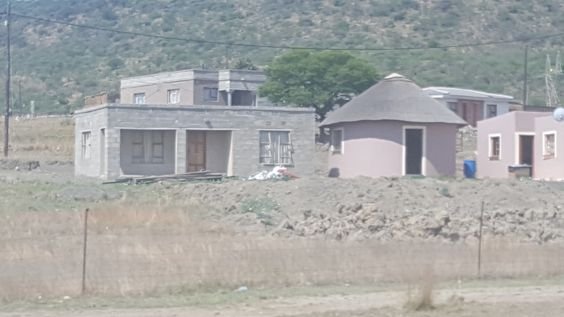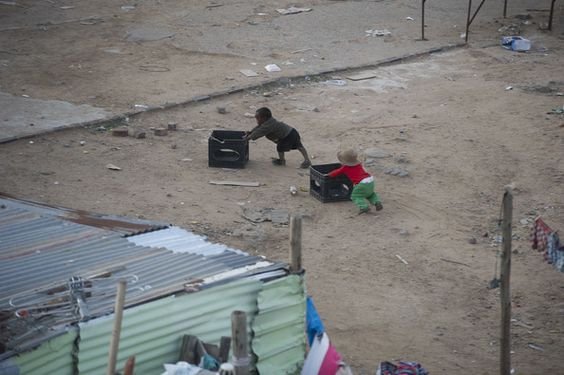This past weekend my hubby and I did a bit of travelling, we went to see my parents who live about 4 hours away from us. As I watched the scenery that passed by I was reminded of how beautiful my country is, the grasslands, the mountains, the wild life - it's magnificent! But, in some areas, the picture wasn't so pretty.
As we drove further from the city we lived and into more rural areas, we were hit with the picture of poverty. Houses made from tin, grass and other bits and bobs (whatever one could find that would make fit as a roof and four walls). Chickens and goats roamed the sidewalks freely and children built towers from the litter strewn around them. As I thought about my comfortable and sheltered life, I was reminded how poverty stricken our country actually is, how poverty has become a part of our African culture, so much so that we become oblivious to the state of it. What made me think about this a bit more is the fact that there is a noticeable divided, you are either knees deep in this poverty, or you are a spectator (perhaps on the greener side of the grass).
How African Cultures Have Adopted The Role Of Poverty
Below is a photo I took of the rural villages we drove past. There were many of these little homes, all dotted along the landscape. Here and there you would find a well-built brick home, these are low cost housing structures that are granted to some by our government, they are tiny and often filled with many family members and friends, more than the four walls can bare. But if you own one of these homes in the village, you are considered rich! So, it goes to show, even the poor have adopted a “rich” status among themselves. We have created a whole new income class!

When I watch the children play with the litter, which is sadly abundant and an indication of how uneducated many (MANY) people are (due to a failing educational system), I realise that to them, this is the norm. Their little imaginations have drawn them to these cast-off items, making them their play things. Their parents watch on, without the blink of an eye – THIS IS HOW THEY PLAY, it has become part of who they are and how they will learn.

Goats and chickens sit on the roofs of old rusty cars, which look very awkward parked next to their accompanying mud huts. A mixture of traditional culture and the modern, and indication that cultures are in fact constantly evolving while desperately hanging on to what made them authentic in the first place. While skeleton-like dogs search for scraps food, so do the villagers at the hardest of times – food was once a big part of the traditional African cultures.
The abundance of food, or its lack, now plays a big role in how often the people of Mali, Senegal and other nations in West Africa gather to eat and how much opportunity there is for families to come together and share their stories. Keeping this connection between family members thriving is a big part of Agile International’s mission. By working to increase the abundance of food, Agile International is helping to keep family bonds strong, culture and history alive. - https://agile-international.org/west-africa-poverty-food-water-facts/
This leaves me with another thought that I am still rolling around in my head is: which is greater, the effect poverty has had on culture, or the effect culture has on poverty.
The “zen-ness” of travelling got me all philosophical, as I am sure you have noticed. And while I was pondering how the traditional cultures have had to adjust to the different circumstances of poverty, I also wondered to what extent have cultural practices lead to poverty.
For instance, in Zulu culture the women have always been in charge of food, from cultivating it, preparing it to serving it. But, Zulu women are not allowed to own land, this is not custom practice. Without being biased, this is indeed a fact, Zulu women have proven to be harder workers than most Zulu men, if they were allowed to own and run the land they live on, perhaps their produce and efforts would result in greater riches?

So much to wrap your head around right? And I am sure this is how it is around the world, not just in Africa. An infinite battle of poverty vs. culture arises – who will win?
We arrived safely at our destination, and the same trip and scenery greeted us as we traveled back home. Nothing visible had changed since we first passed our rural dwellers, but in just a few days, how many of the villagers had succumbed to non-cultural practices just to feed their children, how many women and children lost out on opportunities because their actions would be frowned upon by their people? Just another unfortunate circle of events.

